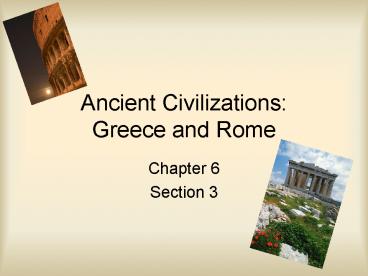Ancient Civilizations: Greece and Rome - PowerPoint PPT Presentation
1 / 18
Title:
Ancient Civilizations: Greece and Rome
Description:
Settled around the Balkan Peninsula and the Aegean Sea around 2000 BC ... Aqueduct: sloped bridge-like structure that carries water. Buildings with domes and arches ... – PowerPoint PPT presentation
Number of Views:2423
Avg rating:3.0/5.0
Title: Ancient Civilizations: Greece and Rome
1
Ancient CivilizationsGreece and Rome
- Chapter 6
- Section 3
2
Early Greeks
- Settled around the Balkan Peninsula and the
Aegean Sea around 2000 BC - Geography and Greek Civilizations
- Rugged country separated by narrow waters
- Development of separate communities (city-states)
rather than one large united kingdom. - Traveled by sea because of rugged terrain
3
Minoans
- Earliest Greek Civilization
- Island of Crete
- Had running water, developed a system of writing
- Sailors and fishermen
4
Mycenaeans
- Controlled Greek mainland from about 1600 BC
1200 BC - Warlike people who lived in tribes
- Conquered Minoans and adopted many aspects from
their culture. E.g. system of writing - Homer Wrote the Iliad historical events, folk
tales, and legends. Trojan War.
5
Greek City-States
- City-State City or town that had its own
government and laws and controlled the land
surrounding it. - Sparta
- Loyal
- Little Personal Freedom
- Powerful Army
- Boys left home to train at age 7
- Girls received intense training at home
- Boys and girls were educated and encouraged to
study music but left little time for the
development of the arts, literature, philosophy
and science.
6
Greek City-States
- Athens
- Developed form of government called a Direct
Democracy citizens take part in making ALL
decisions. - Juries
- More freedoms than Spartans but women could not
participate in government - Slavery was permitted
- Made great contributions to the arts, literature,
philosophy and science - First people to write drama (plays)
- Scientists developed new laws of mathematics and
a way to classify plants and animals
7
Alexander the Great
- Son of King Phillip II King of Macedonia
- Conquered much of the known world including
Greek city-states - Built great centers for learning
- After Alexander died, his kingdom was split into
smaller kingdoms and eventually conquered by the
Romans
8
Early Romans
- Around 750 BC, people called Latins started
settling around the Tiber River in Italy
eventually formed the city of Rome. - Later conquered by the Etruscans who brought
written language to Rome - Culture was strongly influenced by Greeks who
settled in Rome. - Roman religion was also partly based on Greek
beliefs
9
Geography and Roman Civilization
- Geography
- Alps Located north of Italy
- Mediterranean Sea Located west of Italy
- Adriatic Sea Located east of Italy
- Seas helped trade and travel, but left Italy
open to attack - Passages through Alps left open to invasion
- How did the geography of Italy help the Roman
Civilization grow?
10
The Roman Republic
- Etruscan rule overthrown by wealthy Romans and
replaced with a Republic. - Republic a government in which voters elect
leaders to run the state. - Growing
- Wars
- Building bridges and roads
- Started to become a problemHow??
11
Julius Caesar
- Popular speaker won support among poor
- Became a general and conquered more and more
territory for the republic - Was made Ruler for Life by Roman officials
- Many leaders feared his power and he was
assassinated March 15, 44 B.C.
12
The Roman Empire
- Octavian Augustus (honored one)
- Grandnephew of Julius Caesar
- Became ruler after Caesars death
- Helped empire grow even more
- His reign started Pax Romana
- Pax Romana Roman Peace
- Pax Romana
- Stable and peaceful empire
- Laws became more fair
- Strong economy due to widespread trade
- Built many roads and bridges to help trade
- Roman army kept peace by defending boarders
13
Romes Achievements
- Temples
- Palaces
- Arenas
- Bridges
- Roads
- Aqueduct sloped bridge-like structure that
carries water - Buildings with domes and arches
- Language Latin
- Writers
14
Rise of Christianity
- Jews were driven out of the city of Jerusalem,
but continued to practice their faith in
communities outside the city. - The teachings of Jesus
- One true God
- Love others as themselves
- Defended the poor
- Romans thought Jesus would lead an uprising so
they arrested him and sentenced him to death - Romans outlawed Christianity but the religion
still spread - After 300 years, Constantine, the Roman Emperor,
declared his support of Christianity and it
became the official religion of Rome.
15
Decline of Roman Empire
- Army generals started to turn in the Empire to
try and win power for themselves - Army lost loyalty to Rome
- Dishonest leaders
- Civil Wars
- Taxes and cost of goods rose
16
Empire Splits
- Roman Empire was too big to be ruled by one
person - Diocletian (emperor of Rome) selected a
co-emperor Constantine to take over the
eastern part of the empire - Empire in the east faired much better than the
empire in the west
17
Fall of Rome
- Over several years, groups began to invade the
empire from the north and set up tribal kingdoms - Vandals
- Visigoths
- Huns
- In 476 the last emperor in the west was
overthrown by invaders - Empire in the east was able to fight off invaders
and became known as the Byzantine Empire and
lasted until 1453 until if fell to the Ottoman
Turks - How did weak leadership lead to the fall of Rome?
18
(No Transcript)





![[PDF]DOWNLOAD The Story of Greece and Rome PowerPoint PPT Presentation](https://s3.amazonaws.com/images.powershow.com/10134768.th0.jpg?_=202409210212)
![[PDF]DOWNLOAD The Story of Greece and Rome PowerPoint PPT Presentation](https://s3.amazonaws.com/images.powershow.com/10108945.th0.jpg?_=202408250610)
![[PDF]DOWNLOAD The Story of Greece and Rome PowerPoint PPT Presentation](https://s3.amazonaws.com/images.powershow.com/10107605.th0.jpg?_=20240824109)























